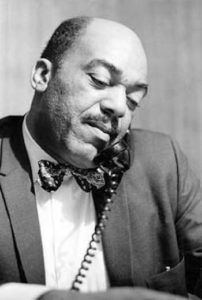
Charles Bussey
*Charles Bussey was born on this date in 1921. He was a Black officer and a Korean War hero.
Charles Bussey was born in Kern, CA., and grew up in Bakersfield, California. After graduating from high school, Bussey attended Los Angeles City College for two years before enlisting in the US military.
Bussey was assigned to fly with the all-Black Tuskegee Airmen tasked to defend US bombers during World War II. His commander, General Benjamin O. Davis Jr., played a big role in shaping Bussey as a soldier. Following World War II, Bussey left the Army and returned to Los Angeles, where he became a policeman. He didn’t like the work and decided to return to college by enrolling at San Francisco State University. After graduating from SFSU in 1948, Bussey rejoined the Army and was eventually stationed in Japan on occupation duty.
On May 26, 1950, Bussey took command of the 77th Engineer Combat Company in Gifu, Japan. The 77th Engineer was an all-Black unit that provided engineer support to the all-Black 24th Infantry Regiment. The 24th Infantry was the only all-Black subordinate unit of the 25th Infantry Division commanded by Major General William B. Kean.
On July 20, 1950, Captain Bussey delivered mail to a platoon in his company stationed in the Korean village of Yecheon during the Korean War. Along the way, he heard rifle fire from the village further up the road. Bussey stopped his vehicle and walked up a small hill that overlooked the village. Captain Bussey saw from his elevated position men dressed in white trying to outflank his men in the village. Bussey ran down the hill and rounded up three truck drivers from another unit parked near the hill. Lieutenant Bussey and his charges, armed with only a .50-caliber machine gun and a .30-caliber machine gun, are credited with killing 258 enemy soldiers.
After the battle, Colonel Bussey asserted that Lieut. Col. John T. Corley, a white officer under whom he served, told him he would not receive the Medal of Honor because the country did not need another Jackie Robinson. Charles Bussey retired from the US Army in 1966 as Lieutenant Colonel. He worked for the next 20 years as a construction consultant before retiring and beginning work on his book about his wartime experiences, Firefight at Yechon: Courage and Racism in the Korean War. Bussey’s book was published in 1991.
In 1994, a campaign was launched to upgrade Captain Bussey’s Silver Star for his actions at Yecheon to a Medal of Honor. Bussey said he wasn’t recommended for the Medal of Honor for racist reasons. He lived for much of his life in Daly City. He pioneered setting up African American businesses in the Hunters Point-Bayview district of San Francisco during the 1960s. Captain Charles Bussey died in a Las Vegas hospital on Oct. 26, 2003. He was 82.